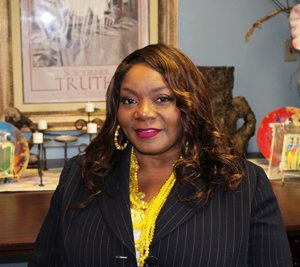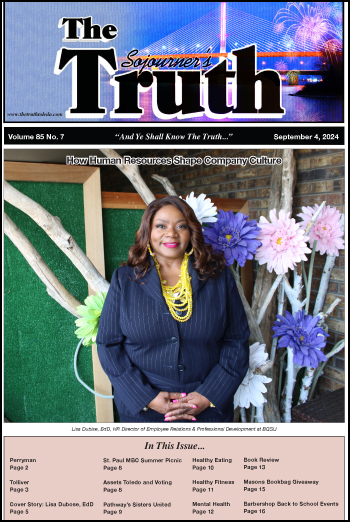
By Asia Nail
The Truth Reporter
When you think about what makes a company a great place to work, you might picture friendly coworkers, supportive bosses or even cool perks like flexible hours. But behind all these elements lies something that many don’t often consider. Human Resources, or HR for short, is the backbone of thriving organizations, shaping the environments where employees spend much of their waking hours—at work. And one person who knows this field inside and out is Lisa Dubose, EdD, a dynamic HR professional with over three decades of experience. Dubose is HR Director of Employee Relations & Professional Development at Bowling Green State University
A Career Choice Rooted in People
Dubose didn’t initially set out to pursue a career in HR. “Initially, I started my college coursework in the field of psychology,” she explains. Her interest in understanding human behavior led her to explore how people interact within organizations. This natural curiosity about what makes people tick, coupled with her desire to create positive work environments, eventually guided her towards a career in HR. “For more than 30 years this has been my intentional career choice.”
Dubose’s journey is a testament to how HR is deeply connected to the study of human behavior. HR is not just about managing paperwork; it’s about managing people, ensuring they feel valued and helping them grow. Her background in business administration, combined with her leadership experience, has undoubtedly enhanced her approach to HR, enabling her to bring a deeper understanding of human needs and motivations to her work.
HR might sound like just another department, but Dubose explains that it’s much more than that. “It’s simple, HR is not just the title of a department. Our work is effectively managing humans. From application to retirement, human resources is a key ingredient in the success of an organization and its people.”
 The Evolution of HR
The Evolution of HR
Over the course of her career, Dubose has witnessed the transformation of HR. “Over my career, I can attest to HR growing as a professional field. We used to be called ‘Personnel Management,’” she recalls. “We have grown from being transactional, where our primary purpose was to fill out new hire paperwork and sign employees up for benefits, to now HR professionals acting as business partners that help meet administrative goals.”
In the past, HR was often viewed as a purely administrative function, responsible for tasks such as payroll processing and handling employee grievances. However, as businesses have evolved, so has the role of HR. Today, HR professionals like Dubose are integral to shaping company culture, driving employee engagement, and contributing to overall business strategy. HR is no longer just about managing people; it’s about creating an environment where employees can thrive and where the organization can achieve its highest potential.
HR as the Roots of a Thriving Organization
To understand the importance of HR, Dubose encourages us to think of a company as a tree. Just as a tree needs strong roots to grow and flourish, a company needs a solid HR foundation to support its growth. “It’s simple. HR is not just a title of a department. Our work is effectively managing humans. From application to retirement, HR is a key element in the success of an organization and its people,” Dubose says.
Without Human Resources professionals, a company would struggle to maintain a healthy work environment, leading to low employee morale, high turnover rates, and ultimately, a decline in productivity. HR professionals like Dubose play a crucial role in ensuring that the workplace is not only functional but also a place where everyone feels motivated and valued.
Working Together for Success
Dubose emphasizes that HR is not a one-person job. It’s a collaborative effort that requires the input and cooperation of various professionals within the organization. “Every HR professional is valuable. We all work together collectively. We cannot operate as a silo; there is always overlap,” she explains.
This collaborative approach is essential because HR functions are interconnected. For instance, recruitment efforts impact employee relations, which in turn affects overall workplace culture.
Teaching the Next Generation of HR Leaders
In her current role at BGSU, Dubose is responsible for enhancing the workforce through policies, programs, and processes. But her influence extends beyond Ohio. For the past six years, she’s been teaching an accelerated HR Master’s program at the University of Notre Dame. “The demographics of our student body are incredibly diverse. The university is very intentional in having a diverse student body, including both American and international students,” Dubose shares.
This diverse mix of students brings a wide range of perspectives to the classroom, enriching discussions and providing valuable insights into how HR practices can be applied across different cultures and industries. “The wealth of knowledge and cultural influence has made the dynamics of discussion even more engaging and multifaceted,” she adds.
Dubose’s role as an educator allows her to shape the next generation of HR leaders, passing on the knowledge and experience she has gained over her career.
She is particularly proud of the impact she has had as a woman in education here diversity in leadership is still evolving. “As an African American woman, many students may have never had the opportunity to be instructed by someone that looks like me,” Dubose reflects. “Being in this position not only adds value to me, but also influences how we all view HR and its importance to organizational success.”
Adapting to New Challenges
As we all remember, the COVID-19 pandemic brought unprecedented challenges to the workplace, forcing organizations to rethink how they operate. HR professionals have been at the forefront of these changes, helping companies navigate the complexities of remote work, health and safety concerns, and shifting employee expectations.
2020, Dubose notes, “Brought new challenges to HR,” pushing the field to adapt in unprecedented ways. “The pandemic brought with it the need to look at how we handle business in different ways.”
Remote working was intended for that short time, but as we know now, many businesses have since re-evaluated the effectiveness of employees in remote and hybrid jobs. For both employers and workers alike, it’s a win-win—businesses benefit from reduced overhead costs and increased flexibility, while employees enjoy a better work-life balance and the ability to work from locations that suit their needs.
A Career with Purpose
For those considering a career in HR, Dubose offers valuable advice: “If there is interest in the industry, just know this is a career, not a job. Join professional organizations such as the Society of Human Resources Professionals to gain insights on what is trending in our field. Also, certifications are available to expand your knowledge on all the facets of this field.”
Dubose’s passion for HR is evident in everything she does. For her, HR is not just a job—it’s a calling. It’s about making work a better place for everyone, understanding that behind every great company is a team of HR professionals working hard to support and uplift their colleagues.
As businesses continue to evolve, the role of HR will only become more critical. With leaders like Lisa Dubose, EdD, at the helm, Human Resources will continue to shape the future of work, ensuring that organizations are not just places of business, but communities where people can grow, thrive and succeed.

